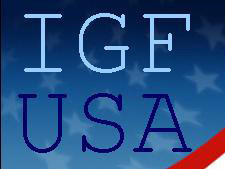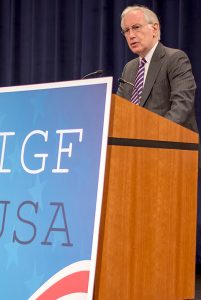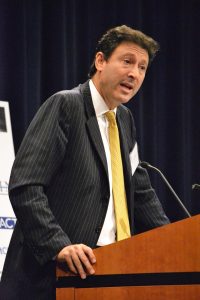 Brief session description:
Brief session description:
Thursday, July 26, 2012 – Ambassador Phil Verveer, coordinator for international communications and information policy at the US State Department, offered opening remarks and introduced Terry Kramer, the former president of Vodafone North America, who was appointed in the spring of 2012 to be US Ambassador to the World Conference on International Telecommunications, which will take place Dec. 3-13 in Dubai, United Arab Emirates. The International Telecommunication Union description of WCIT: “The conference is a review of the current International Telecommunications Regulations (ITRs), which serve as the binding global treaty outlining principles that govern the way international voice, data and video traffic is handled, and which lay the foundation for ongoing innovation and market growth.” The US position in 2012 on the ITRs is that the current model of governance for the Internet is functioning adequately as it evolves, allowing for more freedom and innovation than a more-regulated model. Other countries, including Russia and China, are expected to contest the US position. Shortly after their appearances at IGF-USA, the US Department of State posted a formal document outlining its “Initial Proposals” for WCIT; it can be found here.
Details of the session:
Ambassador Phil Verveer, US coordinator for International Communications and Information Policy, emphasized the importance of Internet freedom at the Internet Governance Forum-USA Thursday morning at Georgetown Law Center.
The Universal Declaration of Human Rights, adopted by the United Nations General Assembly in 1948, directly supports Internet freedom, Verveer said.
 “Article 19:2 (states), ‘Everyone has the right to freedom of opinion and expression. This right includes freedom to hold opinions without interference and to seek, receive and impart information and ideas through any media and regardless of frontiers,’” he said. “Every human is entitled to these rights simply by being human.”
“Article 19:2 (states), ‘Everyone has the right to freedom of opinion and expression. This right includes freedom to hold opinions without interference and to seek, receive and impart information and ideas through any media and regardless of frontiers,’” he said. “Every human is entitled to these rights simply by being human.”
Although it has been ratified by many nations, the declaration is not bound by international law, and Verveer acknowledged that differing government philosophies result in different Internet policies.
“There is a compelling case for Internet freedom grounded in human rights, but the problem, of course, is that it is not nearly enough to persuade some countries that have strong reasons to interfere with Internet freedom,” he said.
Verveer pointed out that the declaration does not provide the only support for Internet freedom. The economy also allows for strong incentive to liberalize Internet policy.
From an economic standpoint, the argument for Internet freedom is straightforward: The Internet is an enormous commercial channel, and there is a positive correlation between its accessibility and its economic potential.
“There is the fundamental intuition that serious reductions in innovation will handicap economic growth,” Verveer said.
Verveer said he expects that delegates to the 2012 World Conference of International Telecommunications (WCIT) in Dubai will be in agreement that the amendments made to the International Telecommunication Regulations (ITRs) in 1988 be upheld.
“The United States will … prevent changes of ITRs that would … constitute a reversal of the liberalized telecommunications environment that has prevailed virtually everywhere in the world since 1988,” he said. “Our principal goal for WCIT involves maintaining this enabling environment, with complete confidence that if we are successful the benefits of information and communications technology will continue to increase and to expand to billions of additional people.”
 Verveer then yielded the stage to Terry Kramer, US ambassador to the WCIT. Kramer charged the audience to think critically about the Internet’s future and about the messages relayed to other stakeholders in the global network.
Verveer then yielded the stage to Terry Kramer, US ambassador to the WCIT. Kramer charged the audience to think critically about the Internet’s future and about the messages relayed to other stakeholders in the global network.
“When it comes time for us to advocate directly (for Internet freedom), it will be very important that we come from a position of knowledge and fact, not just ideology,” he said. “(We must) be able to speak from knowledge about what worked in the past and how we see the future evolving.”
Kramer attested to the value of the multistakeholder model, given the distributed nature of the Internet and the diversity of its users. He emphasized the need to meet with international players at the forefront of the Internet’s evolution. “The multistakeholder model is the only effective one that will work,” he said. “The Internet is too global to have one organization in control. …We need to get examples of what success looks like (across the world).”
Kramer warned that some stakeholders’ ambitions are likely to oppose Internet freedom, openness and accessibility.
“There have been several proposals that … are worrisome,” he said. “One category of these is the control of traffic and the control of content. From every angle, that results in a bad outcome. It creates cynicism … and workaround solutions. … But there will be wisdom and good ideas here that we can effectively advocate.”
In a document dated Aug. 1, 2012, the Bureau of Economic and Business Affairs of the US Department of State posted its “Initial Proposals to the World Telecom Conference.” It read in part:
Responding to the ITU’s call for proposals for the conference, the US WCIT Head of Delegation, led by Ambassador Terry Kramer, is submitting a first round of proposals. These initial proposals reflect the US belief that the ITRs should remain a high-level treaty that establishes an international framework for market-driven development of telecommunications networks and services.
“The ITRs have served well as a foundation for growth in the international market,” Ambassador Kramer said. “We want to preserve the flexibility contained in the current ITRs, which has helped create the conditions for rapid evolution of telecommunications technologies and markets around the world.”
The US proposals include:
- Minimal changes to the preamble of the ITRs;
- Alignment of the definitions in the ITRs with those in the ITU Constitution and Convention, including no change to the definitions of telecommunications and international telecommunications service;
- Maintaining the voluntary nature of compliance with ITU-T Recommendations;
- Continuing to apply the ITRs only to recognized operating agencies or RoAs; i.e., the ITRs’ scope should not be expanded to address other operating agencies that are not involved in the provision of authorized or licensed international telecommunications services to the public; and
- Revisions of Article 6 to affirm the role played by market competition and commercially negotiated agreements for exchanging international telecommunication traffic.
The US will carefully monitor and study the proposals submitted by other countries. The US is concerned that proposals by some other governments could lead to greater regulatory burdens being placed on the international telecom sector, or perhaps even extended to the Internet sector — a result the US would oppose.
“We will not support any effort to broaden the scope of the ITRs to facilitate any censorship of content or blocking the free flow of information and ideas,” Ambassador Kramer said. “The United States also believes that the existing multi-stakeholder institutions, incorporating industry and civil society, have functioned effectively and will continue to ensure the health and growth of the Internet and all of its benefits.”
The US will formally constitute its official WCIT delegation in mid-September. It will be comprised of experts from US government agencies and the private sector, including industry and civil society. This reflects the multi-stakeholder approach that has been a hallmark of Internet development and governance. Ambassador Kramer will carry out an extensive schedule of bilateral meetings with his counterparts from other nations around the world. Additional proposals will be submitted prior to the WCIT, as governments finalize their positions and proposals.
– Katie Blunt
The multimedia reporting team for Imagining the Internet at IGF-USA 2012
included the following Elon University students, staff, faculty and alumni:
Jeff Ackermann, Bryan Baker, Ashley Barnas, Katie Blunt, Mary Kate Brogan, Joe Bruno, Kristen Case, Allison D’Amora, Colin Donohue, Keeley Franklin, Janae Frazier, Ryan Greene, Audrey Horwitz, Elizabeth Kantlehner, Perri Kritz, Morgan Little, Madison Margeson, Katie Maraghy, Brennan McGovern, Brian Mezerski, Julie Morse, Janna Anderson. Mid-page photo of Phil Verveer courtesy of Paul Brigner.

